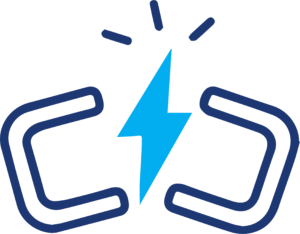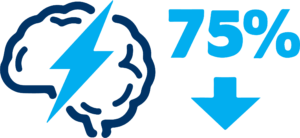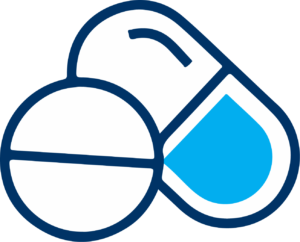Seizure reduction in these hard-to-treat epilepsies
Fewer seizures in people living with LGS
Cannabidiol significantly reduced drop seizures in people living with LGS.
Monthly drop-seizure* reduction over the 14-week treatment period. In another study, there was a 44% monthly reduction in drop seizures among patients taking CLASEPI (cannabidiol) in the 20 mg/kg/day group, compared with a 22% reduction taking placebo.
In another study, there was a 44% monthly reduction in drop seizures among patients taking CLASEPI (cannabidiol) in the 20 mg/kg/day group, compared with a 22% reduction taking placebo.
 With CLASEPI (cannabidiol), freedom from drop seizures is possible for some
With CLASEPI (cannabidiol), freedom from drop seizures is possible for some
4% of people taking CLASEPI (cannabidiol) 20 mg/kg/day (compared with 0% of people taking placebo) reported no drop seizures. In another study, 4% of people taking CLASEPI (cannabidiol) 10 mg/kg/day and 7% who took CLASEPI (cannabidiol) 20 mg/kg/day (compared with 1% of people taking placebo) reported no drop seizures.
 Substantial reduction in drop seizures
Substantial reduction in drop seizures
3x more people living with LGS saw a substantial reduction of 75% or greater in their drop seizures with CLASEPI (cannabidiol) 10 mg/kg/day (11%), compared with placebo (3%).
 More than 500 participants
More than 500 participants
More than 500 people with LGS and Dravet syndrome took part in 3 clinical studies—the largest placebo-controlled, clinical study program of these conditions to date. Even after these trials were completed, the majority of people continued taking CLASEPI (cannabidiol) for more than a year.
 Included patients who failed on several medicines
Included patients who failed on several medicines
CLASEPI (cannabidiol) clinical trials included people who had typically failed on 4-6 prior antiseizure medicines. These people were typically also taking 3 antiseizure medicines at the time, but their seizures were still uncontrolled.
 Most common side effects
Most common side effects
The most common side effects of CLASEPI (cannabidiol) include increase in liver enzymes, sleepiness, decreased appetite, diarrhea, fever, vomiting, feeling very tired and weak, rash, sleep problems, and infections. Fewer seizures in people living with Dravet syndrome
CLASEPI (cannabidiol) reduced convulsive seizures in people living with Dravet syndrome Monthly convulsive-seizure* reduction over the 14-week treatment period. In another study, there was a 44% monthly reduction in drop seizures among patients taking CLASEPI (cannabidiol) in the 20 mg/kg/day group, compared with a 22% reduction taking placebo.
In another study, there was a 44% monthly reduction in drop seizures among patients taking CLASEPI (cannabidiol) in the 20 mg/kg/day group, compared with a 22% reduction taking placebo.
 With CLASEPI (cannabidiol), freedom from convulsive seizures is possible for some
With CLASEPI (cannabidiol), freedom from convulsive seizures is possible for some
7% of people taking CLASEPI (cannabidiol) 20 mg/kg/day (compared with 0% of people taking placebo) reported no convulsive seizures.†
 Nearly 2x more people living with Dravet syndrome saw a substantial reduction of 75% or greater
Nearly 2x more people living with Dravet syndrome saw a substantial reduction of 75% or greater
in their convulsive seizures with CLASEPI (cannabidiol) 20 mg/kg/day (23%), compared with placebo (12%).
 More than 500 participants
More than 500 participants
More than 500 people with LGS and Dravet syndrome took part in 3 clinical studies—the largest placebo-controlled, clinical study program of these conditions to date. Even after these trials were completed, the majority of people continued taking CLASEPI (cannabidiol) for more than a year.
 Included patients who failed on several medicines
Included patients who failed on several medicines
CLASEPI (cannabidiol) clinical trials included people who had typically failed on 4-6 prior antiseizure medicines. These people were typically also taking 3 antiseizure medicines at the time, but their seizures were still uncontrolled.
 Most common side effects
Most common side effects
The most common side effects of CLASEPI (cannabidiol) include increase in liver enzymes, sleepiness, decreased appetite, diarrhea, fever, vomiting, feeling very tired and weak, rash, sleep problems, and infections. CLASEPI (cannabidiol) reduced the frequency of seizures in TSC by half
Reduction in TSC-associated seizures* over the 16-week treatment period.
 With CLASEPI (cannabidiol), freedom from drop seizures is possible for some
With CLASEPI (cannabidiol), freedom from drop seizures is possible for some
6% of people taking CLASEPI (cannabidiol) achieved freedom from TSC-associated seizures (compared with 0% of people taking placebo).
 Substantial reduction in TSC seizures with CLASEPI (cannabidiol)
Substantial reduction in TSC seizures with CLASEPI (cannabidiol)
More people reduced their TSC seizures by 75% or more with CLA SEPI (cannabidiol)25 mg/kg/day (19%), compared with 0% of people taking placebo.
 More than 200 participants
More than 200 participants
More than 200 people with TSC took part in a clinical trial to determine if CLASEPI (cannabidiol) reduced the rate of seizures associated with TSC. After this trial was completed, almost all patients continued taking CLASEPI (cannabidiol) as part of an extension of the study.
 Included patients who failed on several medicines
Included patients who failed on several medicines
CLASEPI (cannabidiol) clinical trials included people who had typically failed on 4-6 prior antiseizure medicines. These people were typically also taking 3 antiseizure medicines at the time, but their seizures were still uncontrolled.
 Most common side effects
Most common side effects
The most common side effects of Clasepi include increase in liver enzymes, sleepiness, decreased appetite, diarrhea, fever, vomiting, feeling very tired and weak, rash, sleep problems, and infections.
What is the most important information I should know about Clasepi (Cannabidiol)?
Clasepi is a prescription medicine that is used to treat seizures associated with Lennox-Gastaut syndrome, Dravet syndrome and/ or tuberous sclerosis complex in people 1 year of age and older.
- Take Clasepi exactly as your healthcare provider tells you.
- Your healthcare provider will tell you how much Clasepi to take and when to take it.
- Measure each dose of Cannabidiol using the appropriate dosing syringes that come with Clasepi.
Clasepi may cause liver problems. Your healthcare provider may order blood tests to check your liver before you start taking Clasepi and during treatment. In some cases,Clasepi treatment may need to be stopped. Call your healthcare provider right away if you develop any of these signs and symptoms of liver problems during treatment with Cannabidiol:
- loss of appetite, nausea, vomiting
- fever, feeling unwell, unusual tiredness
- yellowing of the skin or the whites of the eyes (jaundice)
- itching
- unusual darkening of the urine
- right upper stomach area pain or discomfort
Clasepi may cause you to feel sleepy, which may get better over time.
Like other antiepileptic drugs, Clasepi may cause suicidal thoughts or actions in a very small number of people.
These are not all of the possible side effects of Cannabidiol. For more information, ask your healthcare provider or pharmacist.
Tell your healthcare provider about any side effect that bothers you or that does not go away. Call your doctor for medical advice about side effects
Do not drive, operate heavy machinery, or do other dangerous activities until you know how Cannabidiol affects you. Cannabidiol may cause you to feel sleepy.
Do not take Clasepi if you are allergic to cannabidiol or any of the ingredients in Cannabidiol.
Do not stop taking Clasepi without first talking to your healthcare provider. Stopping a seizure medicine such as Clasepi suddenly can cause you to have seizures more often or seizures that do not stop (status epilepticus).
- Store Clasepi at temperature mentioned on bottle pack.
- Always store Clasepi in an upright position.
- Do not freeze.
- Keep the cap tightly closed.
- Use Clasepi within 12 weeks of first opening the bottle. Throw away (dispose of) any unused medicine after 12 weeks.
Keep Clasepi out of the reach of children
